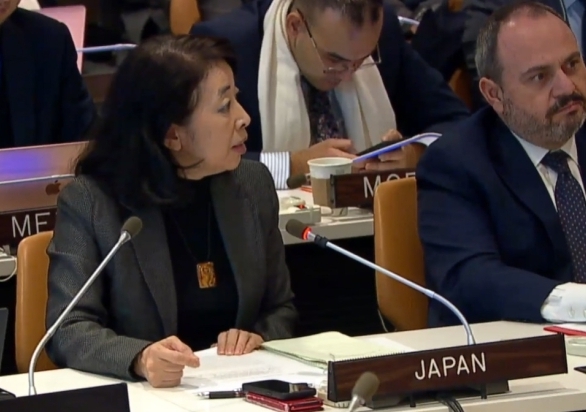安全保障理事会・平和構築委員会(PBC)間の対話・協力強化に関する安保理アリアフォーミュラ会合における志野大使ステートメント
令和5年12月20日

(As delivered)
Thank you very much, Mr. Chair. I thank Brazil for organizing this Arria-Formula on the theme which Japan puts of the highest importance. I extend my gratitude to the briefers for their valuable insights shared today.
To begin, I express my appreciation to Brazil, an informal coordinator between the Security Council and the Peacebuilding Commission (PBC), for convening this meeting. This exemplary initiative further strengthens the interaction between these two bodies, on which Japan places great importance. In June of this year, together with Ecuador and Norway, we organized a seminar inviting all the Council and the PBC members. The seminar focused on context-specific, participatory, and adaptive approaches to conflict prevention and sustaining peace. Such dialogues between the Council and the PBC, including with the Council’s subsidiary bodies, should be held more frequently and systematically, with Chair’s words, “more structured”. It deepens the understanding of each body's expected role within the broader peacebuilding architecture.
Additionally, it is imperative to better utilize the PBC’s advisory role. We, as Security Council members, should remind ourselves that we can request advice from the PBC, while the PBC can also seek advice from the Council to set its agenda, as outlined in the twin founding resolution of the PBC. Both bodies should utilize this reciprocal communication channel and take actions based on each other’s advice for the effective implementation of their mandates. The recent inclusion of language in the Security Council Resolution for the mandate renewal of Colombia Verification Mission, which was also part of the advice from the PBC, is a positive step that should be built upon.
Mr. Chair,
Considering the Secretary-General’s call in the New Agenda for Peace for more effective multilateral actions and looking ahead to the Summit of the Future and the 2025 Peacebuilding Architecture Review, I would like to stress the following points regarding further cooperation between the two bodies, like previous speakers and briefers mentioned, to aid in smoother transition in conflict-affected countries and conflict prevention.
Ensuring a smooth transition after the Council decides on the withdrawals of peacekeeping operations remains a significant challenge. The UN Missions, UN country teams, and donors should communicate well to maximize the impact of their post-withdrawal assistance. The PBC can serve as a venue to facilitate such discussions, and can support peacebuilding processes, particularly when countries exit the Council’s agenda.
To advance conflict prevention, it's crucial to identify root causes, and match effective preventive measures among UN tools. The PBC is well-positioned to discuss root causes and detect conflict signs through various geographic and thematic meetings involving national authorities and local entities. Such signs can be reported as an early warning to the Council.
In conclusion, allow me to assure you, although you all know too well, of Japan’s continued commitment to advancing these ideas to foster more effective cooperation between the Council and the PBC.
I thank you, Mr. Chair.
